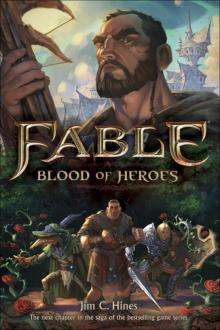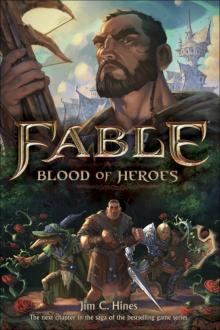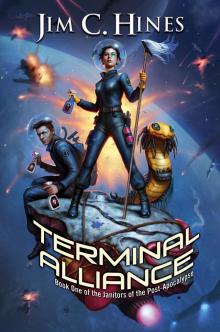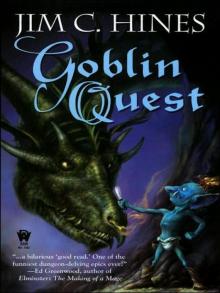- Home
- Jim C. Hines
Terminal Alliance
Terminal Alliance Read online
The Finest in Science Fiction and Fantasy from
JIM C. HINES:
JANITORS OF THE POST-APOCALYPSE
TERMINAL ALLIANCE (Book One)
MAGIC EX LIBRIS
LIBRIOMANCER (Book One)
CODEX BORN (Book Two)
UNBOUND (Book Three)
REVISIONARY (Book Four)
THE PRINCESS NOVELS
THE STEPSISTER SCHEME (Book One)
THE MERMAID’S MADNESS (Book Two)
RED HOOD’S REVENGE (Book Three)
THE SNOW QUEEN’S SHADOW (Book Four)
THE LEGEND OF JIG DRAGONSLAYER
GOBLIN QUEST (Book One)
GOBLIN HERO (Book Two)
GOBLIN WAR (Book Three)
Copyright © 2017 by Jim C. Hines.
All Rights Reserved.
Jacket art by Daniel Dos Santos.
Jacket design by G-Force Design.
DAW Book Collectors No. 1773.
Published by DAW Books, Inc.
375 Hudson Street, New York, NY 10014.
All characters and events in this book are fictitious.
Any resemblance to persons living or dead is strictly coincidental.
The scanning, uploading, and distribution of this book via the Internet or any other means without the permission of the publisher is illegal, and punishable by law. Please purchase only authorized electronic editions, and do not participate in or encourage the electronic piracy of copyrighted materials. Your support of the author’s rights is appreciated.
Ebook ISBN: 9780756412760
DAW TRADEMARK REGISTERED
U.S. PAT. AND TM. OFF. AND FOREIGN COUNTRIES
—MARCA REGISTRADA
HECHO EN U.S.A.
PRINTED IN THE U.S.A.
Version_1
To Mike, Christian, Jim, and the rest of the Launch Pad Crew.
Contents
Also by Jim C. Hines
Title Page
Copyright
Dedication
Author’s Note
Chapter 1
Chapter 2
Chapter 3
Chapter 4
Chapter 5
Chapter 6
Chapter 7
Chapter 8
Chapter 9
Chapter 10
Chapter 11
Chapter 12
Chapter 13
Chapter 14
Chapter 15
Chapter 16
Chapter 17
Chapter 18
Chapter 19
Chapter 20
Chapter 21
Chapter 22
Chapter 23
Chapter 24
Author’s Note
Before I get into the thank yous, I wanted to answer a few questions from readers and fans. Most of these came in via Twitter or Facebook.
From Chris: What has been the biggest surprise (or unexpected benefit) since you started writing full time? I started writing more-or-less full time in September of 2015. I knew I wouldn’t magically become a SuperAuthor, putting out twelve books a year, but I was still surprised at how difficult it could be to balance writing with everything else—taking care of the kids, running errands, housework, walking the dogs . . . (Not to mention getting out to catch Pokémon.) I thought I knew how much discipline and planning and structure I’d need. I was mistaken. But I’m getting better.
From both Illona Andrews and TheBarbarienne: How can you tolerate a giant beard when it’s so freaking hot out? It’s a sacrifice I’m willing to make to look this sexy! Also, the warmth of the Giant Beard is balanced out by the draftiness of the bare scalp.
From Piers: What’s the fastest land animal Our cat Pippin when he hears a can opener in the kitchen.
From Paul: What draws you to use humor so much in your fiction? (This is far from your first humorous SFF after all!) I believe humor is incredibly powerful and valuable. It brings laughter. It helps us cope with darkness. It allows us to tell difficult and dangerous truths. It’s a way of pointing out the absurdities of life. It creates connections between people. Also, it’s a lot of fun to write!
I’ll try to do another batch of questions with the next book. For now, on to the gratitude! Thanks first to the Launchpad Astronomy Workshop, a week-long crash course taught by Mike Brotherton and other professional astronomers. (That’s right, I used real science for parts of this book!)
Thanks as always to my editor Sheila Gilbert—now Hugo Award-winning editor Sheila Gilbert!—and everyone else at DAW Books.
Props to Dan Dos Santos for the marvelous cover art! I particularly love his depiction of Grom.
Thank you to my agent Joshua Bilmes and the rest of the JABberwocky crew.
If you’re reading this note in a language other than American English, it means someone spent a lot of time translating not just my words, but the tone and humor and style of the story. Huge thanks to the translators who have worked so hard on my various books over the years.
Finally, all my love and gratitude to my wife Amy and my children for supporting and putting up with me through yet another one of these things, with all the emotional ups and downs that come with writing a book.
I hope you all enjoy it.
“Marion Adamopoulos.”
The circular training room fell silent. The other humans of Marion’s crèche turned toward the bubbling hot spring in the center.
Scheherazade pulled herself to the edge of the spring, fixing Marion with one large black eye. “Names are very important to humans. I don’t believe that one was in the database of suggested names.”
“It’s from our history review. It’s the name I chose.” Marion spread her arms. She didn’t realize until after the fact that she was mimicking Krakau defensive body language. Deliberately, she folded her arms and stared defiantly back at their Awakening and Orientation Officer.
Most Krakau massed less than the average human. They were roughly tube-shaped, with nine tentacles—arms—limbs? Marion had struggled with the difference. In Human language, the three smooth, snakelike primary limbs with the flat, diamond-shaped pads on the end were the tentacles. The pads were covered in differently sized and surprisingly dexterous suction cups.
The lower six limbs were similar to those of an Earth octopus, covered in suction cups from tip to torso. These lower limbs were used for propulsion and mobility, but for some reason were called “arms” in Human.
To quote Scheherazade, humans were strange and illogical, and their language reflected that.
“It’s been twenty-three days since your awakening,” said Scheherazade, her black, beaklike mouth grinding in confusion. A translator implant, like a large silver pearl in the yellow skin of the Krakau’s throat, repeated the clicks and whistles in Human. “Your ‘rebirth,’ as some humans call it. You have another month before you’ll be given your first assignment. Perhaps you’d like to take more time to consider—”
“This is my name,” Marion interrupted. “You chose your own human name. I have the right to choose mine.”
Every Krakau adopted a name based on the closest thing humans had to a universal language: music. They each pored over hours of intercepted Earth signals and recordings to find the melody best suited to her personality.
By now, the other humans had begun whispering to one another. Scheherazade flicked a tentacle in annoyance, spraying droplets of hot, salty water onto several of the humans. “You know the histor
y of that name?”
Marion recited the answer from memory. “Marion Adamopoulos was an early twenty-second-century scientist who helped destroy human civilization.”
“Why choose a name associated with so much death and destruction?”
“As a reminder of what we did to ourselves, and of how much we owe the Krakau for giving us a second chance.”
It was an honest answer, if incomplete. The other reason was simpler: she liked the sound of it. Adamopoulos. It spilled lyrically from the tongue.
“So be it.” Scheherazade extended a tentacle to note the decision on the glassy, waterproof console beside her pool, then turned to the next human. “And you?”
The human, a male with bushy black hair and a missing eye, swallowed nervously. “I reviewed the human name database. I can’t decide if I’d rather be called Nelson Mandela, Rosalind Franklin, or Beyoncé. . . .”
Marion made a note of her fellow humans’ new names, but most of her attention was elsewhere. Another month at the Antarctic Medical Facility and she’d receive her first assignment as a member of the Earth Mercenary Corps. Most humans ended up in the infantry, fighting the Prodryans and helping to keep peace in the Krakau Alliance. After all the Krakau had done to help humanity after their self-imposed apocalypse, she was determined to repay the aliens in whatever way she could.
She’d named herself for a woman who turned humanity into shambling, feral monsters. The Krakau had spent decades trying to reverse that mistake. Soon, Marion would set out to help them make things right.
LIEUTENANT MARION “MOPS” Adamopoulos, commander of the Shipboard Hygiene and Sanitation team on the EMCS Pufferfish, switched off the translation of a nineteenth-century human history textbook she’d been reading and focused her attention on the alert icon on her monocle. “Go ahead.”
“Incoming message from Commander Danube. The Pufferfish has received a distress call from a Nusuran cargo vessel. All hands should prepare for battle and report to the nearest acceleration chamber. A-ring jump in nineteen minutes.”
The words of her personal AI unit, Doc, came from the directional speakers of her comm unit, secured in the bulky collar of her one-piece uniform. Doc himself existed primarily as code etched invisibly into the layers of memory crystal that formed Mops’ green-tinted monocle.
“What’s the status on the rest of the team?”
“JG Monroe is in his quarters. Technician Kumar is working to repair a cracked sewage relay on deck L. I’ve relayed the commander’s instructions to them both. Technician Mozart is in the brig.”
“Of course she is.” Mops stretched, grimacing at the popping of her left shoulder. There was no pain, but the sound and sensation made her cringe. The joint had started acting up two years ago, like machinery past its warranty.
She left her small quarters and hurried toward the center of the Pufferfish. The ship was built like an oversized torpedo, with three elongated weapons pods protruding like outriggers spread equidistant around the hull. The brig was near the aft engines. “How many times is this?”
“This is Crewman Mozart’s fourth incarceration since she was transferred to your SHS team. It’s her eighth during her one-year service with the Earth Mercenary Corps. Three more incidents, and she’ll break the EMC disciplinary record.”
She greeted several of the crew on her way to the central lifts. Doc automatically tagged them with their name and rank, not that Mops needed the assistance. After more than a decade aboard the Pufferfish, she knew them all. “Why wasn’t I notified when it happened?”
“You were off duty. Commander Danube is recommending Technician Mozart be expelled from service.”
“I’m not ready to give up on her.” Mops hurried into the first available lift, joining Sergeant Claus from infantry. She nodded a greeting as the doors closed and the lift shot downward.
“Where you off to, smoothie?” asked Claus. Mops outranked him, but relations between the soldiers and the noncombat crew tended toward the informal, and she’d known Claus for most of her life. His rebirth had been a year after Mops’ own. After Mops, he was one of the oldest humans on the ship.
It was easy to recognize the soldiers, not only by the unit insignia on the right shoulder of their uniforms, but from the scars they accumulated over the years. The left side of Claus’ face was a mess of scar tissue from a flamethrower attack two years back. An old plasma burn striped his right cheek.
The only smooth-skinned humans on an EMC ship were either shipboard maintenance or brand-new recruits. Mops had a few small scars from her life before the Krakau cured her, but those were all hidden beneath her uniform. Nor would anyone mistake the faint lines around her eyes and mouth for battle scars.
“I need to take care of a mess in the brig,” she said.
Claus snorted. “That mess wouldn’t happen to be named Mozart, would it? I hear she picked a fight with a Glacidae this time.”
“It wouldn’t surprise me. I don’t know what I’m going to do with that child. She’s not happy in SHS, but you know infantry won’t take her. Danube wants to send her back to Earth.”
“Ouch.” He pursed his lips, crinkling his ragged blond mustache. “Give me combat drops any day over trying to survive a planet overrun by ferals. You know if she has enough saved up for passage to one of the stations? Humans can make decent money working security.”
“I doubt it. She’s not big on long-term planning.” Or short-term planning, for that matter. “What’s the word on this distress call?”
“Command crew doesn’t tell us grunts anything. We go where they send us and shoot what they tell us.” Claus clapped her arm as the lift came to a halt. “Good luck with Wolf, Lieutenant.”
Mops hurried down the corridor to the heavy brown door labeled Brig and Backup Emergency/Acceleration Shelter in Human.
The door unlocked with a heavy clunk. Inside was a narrow rectangular hallway with eight transparent doors, four to each side. A larger door on the end led to the control room. Two guards approached to greet her.
“Morning, Lieutenant,” said Private Williams, an older man with a permanent smirk, courtesy of a dark knife scar across his cheek. “Come to claim your janitor?”
“It was either that or make her walk the plank.” Mops’ quip was met with blank looks from both guards, who were apparently unfamiliar with old human pirate stories. She sighed and tried a different conversation opener. “How’s your garden coming along?”
Calling Williams’ Earth mosses and lichen a “garden” was stretching things, but given how few plants could survive life on an EMC cruiser, he’d done an amazing job keeping his little collection alive.
“I can’t get the letharia to thrive. It’s not strong enough for the A-ring jumps.”
“That’s the yellow one with the tufts and branches, right?”
“They’re supposed to be green, but ship’s lighting isn’t right.” His expression brightened. “The caloplaca’s doing great, though. If it keeps spreading, I’ll need to pick up some new rocks.”
Mops chuckled and approached the only occupied cell. Glowing letters in the wide, glassy door labeled it Cell 6. “Doc, how long until we jump?”
“Twelve minutes.”
A narrow cot strained to hold Technician Wolfgang Mozart’s bulk. The guards had stripped Wolf of her equipment and harness, leaving her black jumpsuit bare and baggy. A short blue service stripe on her upper right sleeve marked her time in the EMC, just as the two short and one long red Lieutenant stripes on Mops’ denoted her twelve years.
Wolf’s sleeves were pushed back to the elbows, exposing the tattoo of an Earth wolf on her left forearm. She flexed her muscles, and the reactive inks animated the wolf’s jowls, making it bare its teeth in challenge. “I was just doing my job. The Glacidae should be in here, not me. They’re the one who started giving me crap.”
Mops folded her
arms and said nothing. Anticipating her next request, Doc pulled up the incident report details on her monocle.
The cot creaked as Wolf sat up and ran thick fingers through her dark, sweat-spiked hair. She looked Mops up and down, probably trying to assess how much trouble she was in. “I mean that literally, you know. I was busting my ass trying to clear a jam in their toilet. The next thing I know, they’re shooting shit-pellets in my direction.”
“That wasn’t excrement. Technician Gromgimsidalgak was expelling unfertilized eggs.”
“Whatever. It was like a machine gun from their ass.”
“I’m sure Grom was as unhappy about it as you were.” The ship’s four Glacidae crew normally spent a few days in Medical during this phase of their reproductive cycles. It must have snuck up on Grom this time. “Williams, I need Wolf released and her gear returned.”
Williams hesitated. “She assaulted a member of the crew. I’m not supposed to release her—”
“Unless there’s an overriding operational need, and someone supervises her conduct,” Mops interrupted. “My team’s short-staffed and we’re about to jump. If we’re going into battle, I need Wolf on duty, not napping in the brig. I’ll babysit her myself.”
“Yes, sir.” Williams ducked into the command room to fetch Wolf’s equipment while the other guard—Tzu—unlocked the cell.
“It wasn’t just eggs, you know.” Wolf held up her hands. Black scabs dotted her palms. “These are from Grom’s stingers.”
“You threw the first punch.” Mops chuckled. “And not a very good one, from the sound of it. At least not a good enough punch to keep Grom down.”
“There’s one other citation from Security’s report,” said Doc, pulling it up on Mops’ monocle and highlighting a passage near the end.
Mops groaned. “Of all the asinine . . . The rest of the galaxy already thinks of us as barely sentient animals, Wolf. You can’t go around threatening to eat people’s faces!”

 Fable- Blood of Heroes
Fable- Blood of Heroes Terminal Uprising
Terminal Uprising The Stepsister Scheme
The Stepsister Scheme Unbound
Unbound Fable: Blood of Heroes
Fable: Blood of Heroes Codex Born
Codex Born The Snow Queen's shadow pn-4
The Snow Queen's shadow pn-4 The Snow Queen's Shadow (v5) (epub)
The Snow Queen's Shadow (v5) (epub) Goblin Tales
Goblin Tales Goblin Hero
Goblin Hero Terminal Alliance
Terminal Alliance Revisionary
Revisionary Libriomancer: (Magic Ex Libris Book 1)
Libriomancer: (Magic Ex Libris Book 1) Red Hood's Revenge
Red Hood's Revenge Codex Born mel-2
Codex Born mel-2 Goblin Quest
Goblin Quest Goblin War
Goblin War Libriomancer mel-1
Libriomancer mel-1